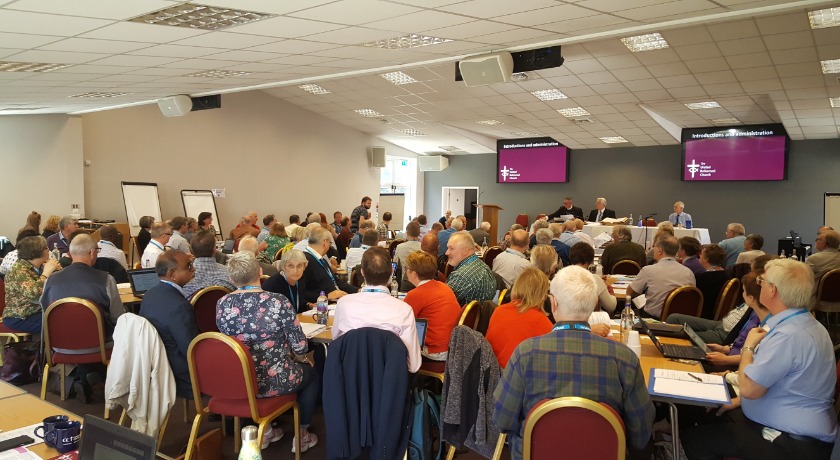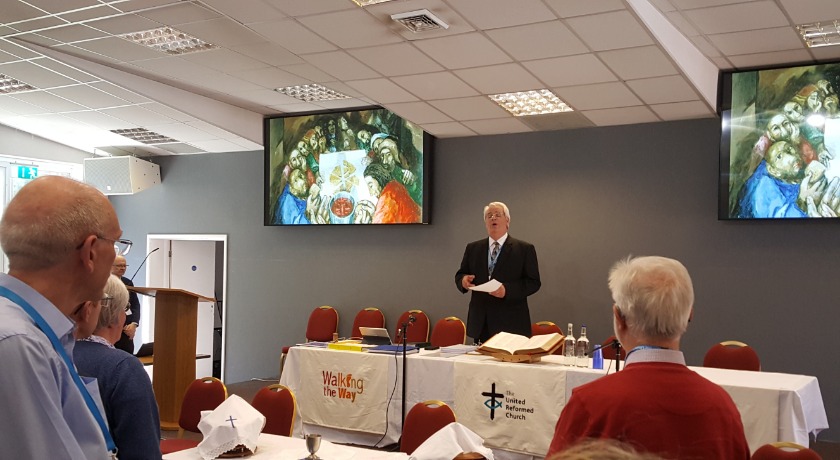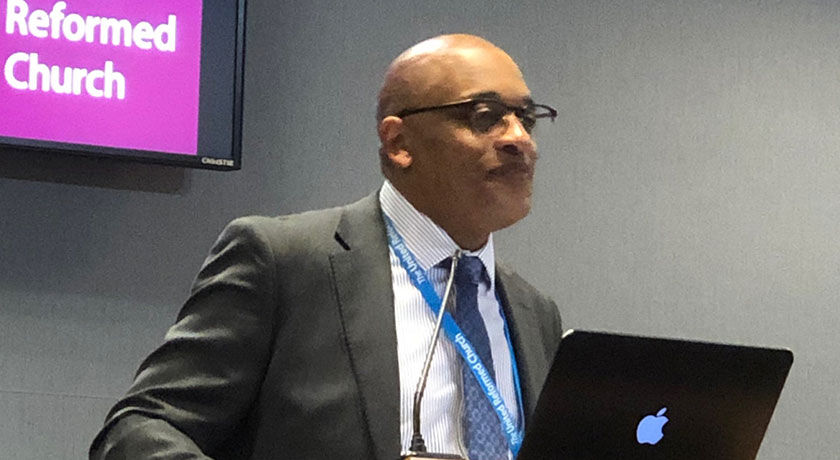 Session one:
Session one:
Opening Worship
The spring meeting of Mission Council, the United Reformed Church’s (URC) executive body of the General Assembly, opened on 13 May at High Leigh Conference Centre, in Hoddesdon. It began with worship led by the Revd David Coaker, Chaplain to Derek Estill, Moderator of General Assembly.
The Revd Neil Thorogood, Principal of Westminster College, Cambridge, gave the sermon during the opening Communion Service and preached on the account of the Last Supper.
Using Mark 14 and the painting ‘The Last Supper’ by German Catholic priest and artist Sieger Köder (1925-2015), Mr Thorogood challenged the meeting to continue listening to what God is saying. He quoted the late Christian writer Rachel Held Evans, who wrote: ‘This isn’t a kingdom for the worthy, it’s a kingdom for the hungry. What more is God saying to us through the church?’
He encouraged Mission Council to explore how the place of worship can be strengthened saying: ‘Worship is one of the most profound ways we have of offering ourselves into the presence of God.’
And in his reflection added: ‘Worship creates and sustains the Church. It is one of the most profound ways we have of offering ourselves in the presence of God and opening ourselves up to the word of light.
‘We hear a cacophony of sound: deep faith and faithlessness; laughter and weeping; high hopes and sometime stifling cynicism; we hear all and at times complacency; we hear love and cruelty.
‘We hear from the messy mass of ordinary sinners that we are. Listening to God speaking through the church and we hear ourselves.
‘God says: I give you open hands and reach out to you and say take, this is my body, this is my blood, I trust you. In remembrance and in obedience in all we do today and in all we do this week, to God be the glory.’
 Introductions and administration
Introductions and administration
The Revd Nigel Uden, Moderator of the URC’s General Assembly, led the introductory session of Mission Council. He welcomed individually all those attending Mission Council for the first time and passed on apologies for absence. The General Secretary, the Revd John Proctor, talked Mission Council through practicalities of the meeting. Mission Council approved the minutes of its last meeting in November 2018 and they were signed by the Moderator.
Mr Proctor told Mission Council about the chalice used in that afternoon’s Communion, which had been presented to the URC by the Disciples Ecumenical Consultative Council of the Church of Christ.
Mission Council enthusiastically agreed to send a letter of congratulation to the Revd Dr David Cornick on receiving the Lambeth Cross, from the Most Revd Justin Welby, the Archbishop of Canterbury, for services to ecumenism.
Paper O1: General secretariat recruitment
Two members of the United Reformed Church’s General Secretariat retire in 2020 – the General Secretary and Deputy General Secretary (Discipleship). Paper O1 considers the recruitment process for their replacement, and the creation of a denominational strategy for the future. The paper was presented to Mission Council by Geoff Shaw, convenor of the Human Resources Advisory Group (HRAG). He explained that HRAG had reviewed the two posts, looking in particular at three points:
- Do the present job descriptions and person specifications reflect needs of the URC?
- Do the two roles fulfil the present and future needs of the denomination?
- How great a role should the General Secretary play in setting a vision for the future of the URC?
Mr Shaw said that the paper was the result of wide consultation and that there had been a good response to HRAG’s survey. (The responses are set out in appendix three of the paper.) HRAG understood from this consultation that the General Secretariat does not have sole responsibility for the vision of the Church, but nurtures and supports the work of others, facilitates and inspires the thinking of others, and fosters an environment that encourages change.
As a result, said Mr Shaw, the paper sets out a framework for recruitment and to put in place a task group to meet the strategic challenges of the URC in next decade and beyond.
The paper contains two resolutions. The first sets out the new job descriptions and person specifications. Mission Council considered the possibility of a jobshare, and did not rule it out, but agreed that was unlikely to be workable. The resolution was passed by consensus.
The second resolution is to create a task group looking at a denominational strategy for the future. A number of representatives argued that this was a job for the General Secretariat, not for a new group. Mission Council did not make a decision about this resolution, but referred the matter to the General Secretary to be brought back to a later meeting of Mission Council.
Session two:
Paper I3: Carbon targets
The Revd Bernie Collins, convenor of mission committee, presented Paper I3: Carbon targets to Mission Council. The paper argued that the URC’s environmental policy should be updated to endorse a net zero carbon emission (when the amount of carbon dioxide and greenhouse gases released on an annual basis is zero or negative) target for the UK.
Mr Collins said: ‘The concern for urgent action to reduce climate change and its harmful effects has been increasingly on the news in recent weeks. This resolution is not written as a response but as part of the movement to take action urgently.’
Although the URC worked with the Baptist Union of GB and the Methodist Church in 2009 to publish Hope in God’s Future – that set out a Christian understand of the challenges facing our global ecology and their theological and ethical implications – which endorsed the UK government’s target for reductions in greenhouse gases (emission reductions of 80% relative to 1990 levels by 2050), new scientific evidence presents a need for urgent action to tackle climate change.
Mr Collins explained that in Scotland, the goal is to reach net zero by 2045 and in Wales also 2050 because of the relative ability of those areas.
He added that a net zero target is achievable with modern technology and if people took steps to make changes in their daily lives. However, the committee felt all this was only possible through clear stable policies to reduce emissions further without delay.
Mr Collins said: ‘The proposal is to campaign and work for net zero well before 2050 to fulfil our responsibility and ability to work for life as God intends for all peoples and all creation as part of our mission.’
A lively discussion was then held which included this question from the floor: ‘What activity counts as acting urgently?’ Mr Collins was then joined at the podium by Simeon Mitchell, URC Secretary for Church and Society, who explained that the environmental policy passed by General Assembly in 2016 was an excellent report.
Mr Mitchell said: ‘It sets out, with a good degree of detail, a whole host of actions recommended to the Church at every level, local and national. It’s a statement of the church and agreed by the church. If we put even part of it [into action], it would go a long way.”
After a minor amendment, the resolutions passed by consensus.
Session three:
Fossil fuels - Paper Z1: URC investment policy and Paper X1: Creating a climate of change – a new approach to ethical investment
The Revd John Proctor, General Secretary of the URC, introduced papers X1 and Z1.
He asked Mission Council to lift standing orders to deal with the two papers concurrently rather than separately and the process adopted would then allow a consensus to be sought. This was agreed by Mission Council.
The Revd Dick Gray then presented Paper Z1 on behalf of the Investment Committee and outlined two arguments: whether it is more effective to disinvest from fossil fuel companies or to keep the investments in order to better engage with them.
Referring to 2015’s Paris Agreement, Mr Gray said it was clear something needed to be done and both papers affirmed this, but the best way forward was not agreed.
He explained that it was perfectly possible for the URC to invest or divest without making any significant impact on the URC’s investment returns.
Mr Gray added on the one hand no divestment, either from individual investors or from groups of church investors has yet made any significant impact in the companies where divestment has been made.
He clarified: ‘It’s mainly us [people] that’s the problem and how we use things in our daily lives that demand the use of fossil fuels. These companies are simply responding to that demand. For example, the fuel we use for our cars.’
Explaining the argument for retaining investments in fossil fuel companies, he explained that the primary reason was not monetary, but as a means for engagement.
He added: ‘The disadvantages of divesting is that we lose our seat with the board. It works to have a seat with them and be respected and heard because of your investment.’
Mr Gray put to Mission Council: ‘Do we appease our consciences by divestment and let companies do what they want or engage with them strongly by retaining a seat at the table?’
The Revd Dr David Pickering, Moderator of the National Synod of Scotland, then presented Paper X1 and reiterated just how much climate change has been featuring in the news recently: the Extinction Rebellion protests in central London, Nobel Peace Prize nominee Greta Thunberg, David Attenborough’s programme Climate Change: the facts and the UK government’s declaration of a climate emergency.
Summarising the papers, Dr Pickering said the URC was well behind the curve of many of its sister denominations, science made clear that action was needed now, the URC’s engagement policy with fossil fuel companies was too little too late, and profiting from harming God’s creation was immoral.
Through a series of slides, Dr Pickering said the URC was at a juncture to either maintain the status quo and persuade some companies to change direction over time or take heed of Attenborough’s warning and act with determination and urgency.
Dr Pickering explained that the URC’s management company’s statement, in paragraph 4.5 which refers to Shell and Total, both fossil fuel companies, aligning with the Paris Agreement is disingenuous.
He explained that pledges made by the two companies is about carbon intensity rather than overall emissions, so their overall emissions could remain the same if they produce double the amount of energy in 2050.
Dr Pickering added that Shell and Total’s current spend on low-carbon investments is a negligible 3% which was dwarfed by their spending on misleading branding and lobbying, just as tobacco manufacturers had done previously.
He commented: ‘The reality is that their strategy is Paris defiant, not Paris compliant.’
With reference to retaining a seat at the engagement table, Dr Pickering said the Methodists have £1.4bn invested and the Church of England £12bn, dwarfing the URC’s £100m.
‘We bring relatively little to the engagement table,’ he added. ‘But strategically, if we went fossil free it could lead to the formation, by our demand, of a fossil free ethical fund, encouraging and enabling our partners to follow and strengthening their engagement hand. We can move from behind the curve to blazing the trail.’
But Dr Pickering painted a picture of intergenerational hope when he referred Greta Thunberg, a Swedish schoolgirl who sparked global climate action among young people, saying: ‘We must listen to the voice of the youth.’
He went onto to outline the significant proportion of local URCs engaged with Eco-church and how Thames North, South Western and the National Synod of Scotland passed resolutions relating to divestment from fossil fuel companies, and Yorkshire announced their divestment.
Dr Pickering ending his presentation by saying: ‘Mission Council – we should hear what our grassroots are saying and respond.’
 Guest speaker: Paul Rochester
Guest speaker: Paul Rochester
The Revd Paul Rochester, General Secretary of Free Churches Group (FCG), spoke to Mission Council on the first evening of its meeting. Outlining the work of the group, he said that the FCG aimed to promote the voice of free churches in the public square, to make a difference to the lives of most vulnerable and to raise the profile of the group.
The core area of the group’s work, Mr Rochester said, was chaplaincy in prison, healthcare and education. There are 7,200 prisoners in England and Wales who are registered as free church, and they are ministered to by 260 free church chaplains. This work is particularly important, he said, because people become Christians in prison, which raises the challenge ‘of how to connect church within prison with church on outside’. Sixty congregations are part of the FCG directory of churches that welcome former prisoners; Mr Rochester asked Mission Council representatives to consider whether their local churches could take part.
While FCG healthcare chaplains work with NHS patients of all denominations, particularly Free Churches, they are working on support for people coming out of hospital as well as in-patients.
The FCG’s education chaplaincy has expanded from focusing on schools to newer work in higher and further education. Mr Rochester said that there is more to be done here: there are three million people in further education in England and Wales, but churches offer them much less support than schools.
Another area of work that Mr Rochester outlined is social cohesion. The FCG has set up a commission with the thinktank Theos looking at Churches’ contribution to social cohesion and is working on a series of case studies.
Mr Rochester said that the FCG was keen to develop its work with local churches. He left Mission Council with the thought: ‘God’s grace is sufficient for everything we need, which means we can do things that are humanly impossible.’
Reporting by Ann-Marie Abbasah, Steve Tomkins and Andy Jackson from the URC Communications Team.




